
As Barack Obama prepares to leave office, the public is divided over a signature policy of his presidency: The Affordable Care Act. Currently, about as many approve of the 2010 health care law as disapprove (48% vs. 47%). The balance of opinion is somewhat more positive today than in October (when 46% approved and 51% disapproved) or April (44% approved, 54% disapproved).
The last time opinion of the 2010 health care law was evenly split was in July 2015, following the Supreme Court’s ruling that upheld the federal government’s ability to provide insurance subsidies through federal exchanges. At that time, 48% said they approved of the law and 49% said they disapproved.

Fully 85% of Republicans disapprove of the ACA, while just 12% approve of it. By contrast, 73% of Democrats approve of the law and just 20% disapprove of it. Democratic support for the law has declined since October, when 82% backed it.
Independents are more supportive of the health care law than at any point in the past six years. In the current survey, 52% of independents approve of the ACA, while 45% disapprove. In October, opinion was nearly the reverse: 41% of independents approved and 54% disapproved of the health care law.

Over the past few months, approval of the health care law has edged higher among young adults.
In late October, those younger than 30 were closely divided over the health care law: 51% approved, while 45% disapproved. Currently, a majority (59%) of those younger than 30 approve of the law, while 38% disapprove. Views of the law among older age groups are little changed from October.
The future of the ACA

As with overall views of the health care law, the public is divided over whether the law should be repealed, expanded or left as it is. As many want Congress to repeal the law as to expand it (39% each), while 15% favor leaving the law as is.
These views are little changed from October, when 44% favored repealing the law, 40% backed its expansion and 13% said lawmakers should leave it as is.
While Republicans remain overwhelmingly in favor of repealing the law, the share favoring repeal has declined from 85% in October to 76% currently.
Support among Democrats for expanding the law has fallen since shortly before the election. Currently, about half (53%) of Democrats say that Congress should expand the ACA, down from 68% in October.
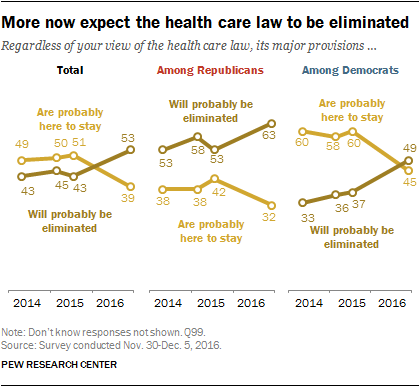
In the wake of the 2016 election, the public has become more skeptical about the ACA’s future. Currently, 53% say its major provisions will probably be eliminated, while 39% say they are probably are “here to stay.”
In surveys conducted in 2014 and 2015, more said the law’s provisions were likely to be preserved than eliminated. In July 2015, 51% said the law was probably here to stay, while 43% said it would probably be eliminated.
Republicans, whose party leaders have pursued efforts to repeal the health care law, are now 10 points more likely than they were in July 2015 to say that the law will probably be eliminated (53% then, 63% now). Just 32% of Republicans now say that major provisions of the law are probably here stay.
Democrats’ views of the law’s future also have changed substantially. In July of last year, Democrats by a wide margin (60% to 37%) said the ACA’s major provisions were probably here to stay. Today, just 45% of Democrats expect the law’s major provisions to endure, while 49% say they probably will be eliminated.
Views of proposed Medicare changes
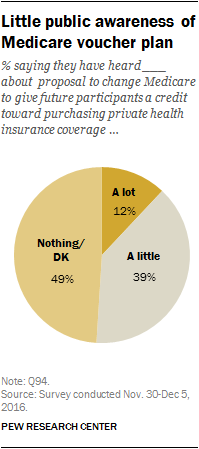
Many are unaware of a Republican proposal that would change Medicare into a voucher program in which future participants would be given a credit towards the purchase of private health insurance coverage.
Just 12% say they have heard a lot about the proposal, while 39% have heard a little about it. Nearly half (49%) have either heard nothing about the proposal or offer no opinion.
Older and better-educated adults are more likely than younger people and those with less education to say they have heard at least a little about the proposal to change Medicare. And somewhat more Democrats (60%) than Republicans (51%) and independents (48%) say they have heard at least a little about the idea.
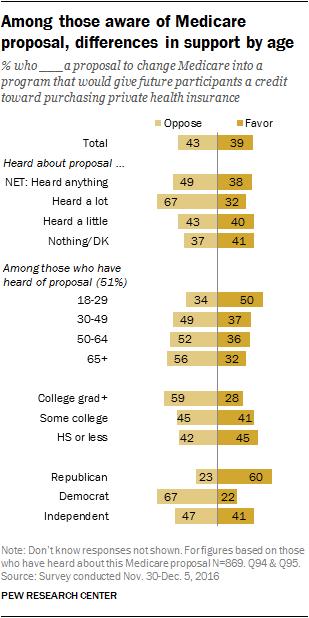
The public is evenly divided between support and opposition towards a proposal to shift Medicare to a voucher style health care coverage program: 43% oppose this change, while 39% favor it and 18% express no opinion either way.
However, the balance of opinion is more negative among the roughly half of adults who have heard about the Medicare proposal: 49% oppose it, while 38% favor it.
Among adults under 30 who have heard of the proposal, more favor (50%) than oppose (34%) it. Among older age groups, there is more opposition than support to the proposed Medicare changes.
Republicans who have heard at least a little about the Medicare proposal favor it by a wide margin (60% to 23%). Two-thirds (67%) of Democrats oppose it, while just 22% favor it.
Republicans who are aware of proposed changes to Medicare are more supportive of the plan than they were in August 2012, when Paul Ryan, the proposal’s primary architect, was named as Mitt Romney’s vice presidential running mate. At that time, 46% of Republicans favored the changes; today, Republican support is 14 percentage points higher (60%). Democrats’ views of the proposal are little changed since 2012.
Medicare voucher proposal more politically divisive than in past
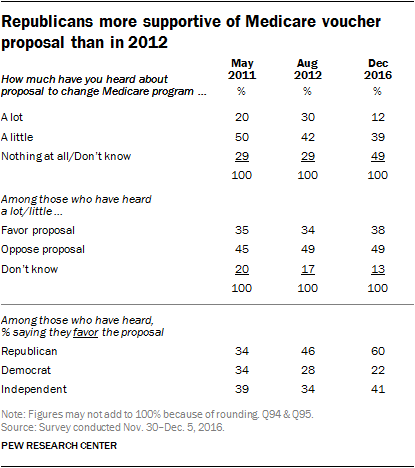
In 2011, when Rep. Paul Ryan (now Speaker Ryan) introduced a Medicare voucher proposal as part of a deficit reduction package, there was little support for the proposal among Republicans or Democrats (34% each).
In the current survey, however, views are far more polarized: 60% of Republicans who are aware of the voucher proposal favor the idea compared with only 22% of Democrats.
Also in 2011, there was evidence that changes like this to Medicare were less popular among older Americans and that these views cut across party lines. Today, that is no longer the case.
A majority of Republicans age 50 and older now favor a Medicare voucher proposal (59%), compared with just 16% of Democrats in this age group.
By contrast, in May 2011, similarly small shares of Republicans age 50 and older and Democrats age 50 and up favored a Medicare voucher idea (31% and 24%, respectively).
Views of the national economy, satisfaction with the state of the nation
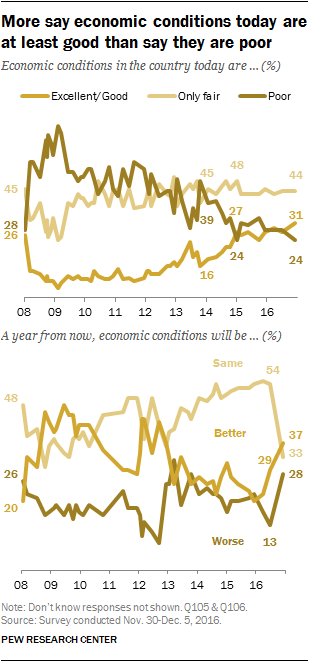
For the first time since 2008, more now say economic conditions in the country today are excellent or good (31%) than say conditions are poor (24%); 44% say the economy is only fair.
In the wake of the election, the public’s economic outlook for the coming year is significantly different than it was in June. The share who expect conditions to stay about the same has declined while the share who expect conditions to be better and the share who expect them to be worse have both increased.
Overall, 37% expect economic conditions to be better in a year, up eight points from June (and 17 points from a year ago). At the same time, the share who expect conditions to be worse in a year has also increased: from 13% in June to 28% in the current survey. The share expecting little change in economic conditions in the coming year stands at 33%, down from 54% five months ago.
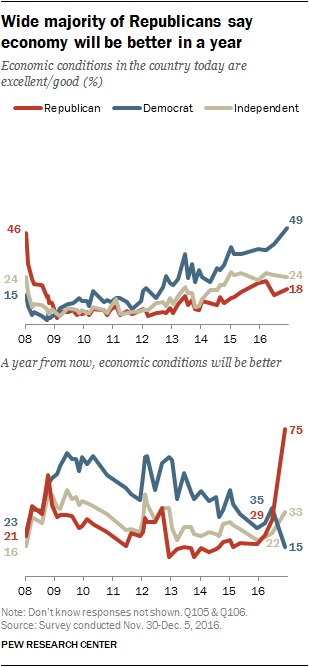
These overall shifts reflect substantial changes in opinion among partisans. Nearly half of Democrats (49%) now rate economic conditions in this country as excellent or good, up slightly from June. There is little change in the share of Republicans or independents who say the economic conditions are excellent or good.
When it comes to the condition of the economy a year from now, Republicans are more than twice as likely as they were in June to think economic conditions will be better: Fully 75% of Republicans think this now, compared with just 29% in June and 16% one year ago.
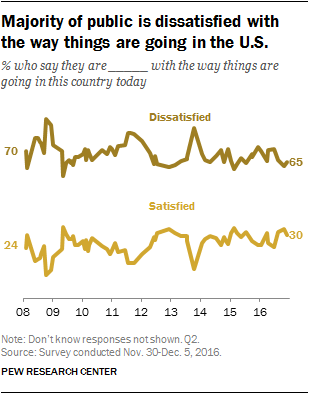
Democrats, by contrast, are increasingly pessimistic about next year’s economic conditions: Just 15% of Democrats think conditions will be better in a year, down from 35% who said this in June.
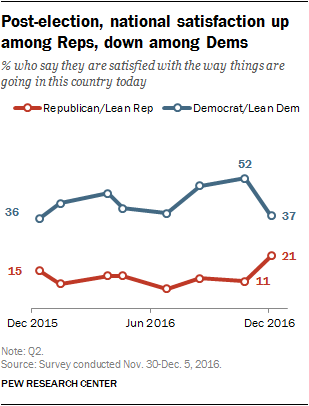
A third of independents (33%) think economic conditions will be better in a year, up 11 points since June.
And while overall national satisfaction is little changed from recent years, there is movement among partisans on this measure.
Overall, a 65% majority of the public is dissatisfied with the way things are going in the country today; 30% are satisfied.
Relatively few Republicans and Republican leaners are satisfied with the way things are going (21%), but this share is up 10 points since October.
Among Democrats and Democratic leaners, national satisfaction has fallen from 52% to 37% over the past two months.




